The pandemic changed how we think about city living. Now in 2025, more people than ever are moving from NYC to suburbs. Recent data shows over 300,000 New Yorkers are planning suburban moves this year. They're looking for remote work options, lower costs, and different lifestyles.
Moving from NYC to suburbs means more than just changing your address. It changes everything - your commute, your weekends, your daily routine. Each suburban town offers something different. Knowing what each place offers helps you pick the right one for your budget and lifestyle.
This guide covers 13 popular suburban destinations for NYC residents. You'll find real costs, lifestyle details, and practical moving tips to help you decide about leaving NYC for suburbs.
Why NYC Residents Are Moving to Suburbs in 2025
Why are so many people moving from NYC to suburbs? The reasons have changed over the past few years. Yes, saving money matters. But there's more to it. People want different things from life now.
The Remote Work Revolution
Remote work changed everything. When you only commute two or three days a week, that house in Connecticut or New Jersey starts looking pretty good. Companies now offer permanent remote work. This means families can choose space and better schools over being close to Manhattan offices.
Financial Considerations Driving Suburban Moves
Moving to suburbs saves more than just rent money. NYC residents moving to suburbs typically cut their total living costs by 30-40%. Yes, property taxes are high in suburbs. But you get better schools and services for that money. Plus, you're building equity instead of paying Manhattan rent. That's real wealth over time.
Quality of Life Improvements
Suburban life offers real benefits, especially for families. You get outdoor space. Better schools. Lower crime. Real neighborhoods where people know each other. Thousands of NYC residents make this trade every year. They give up city excitement for suburban stability. For families and remote workers, it's often worth it.
Top Connecticut Suburbs for NYC Transplants
NYC to Connecticut moving jumped 45% since 2020. It's now one of the top choices for leaving NYC for suburbs. Connecticut gives you everything - close to NYC, great schools, and that New England feel that city people love.
1. Greenwich: The Gold Coast Standard
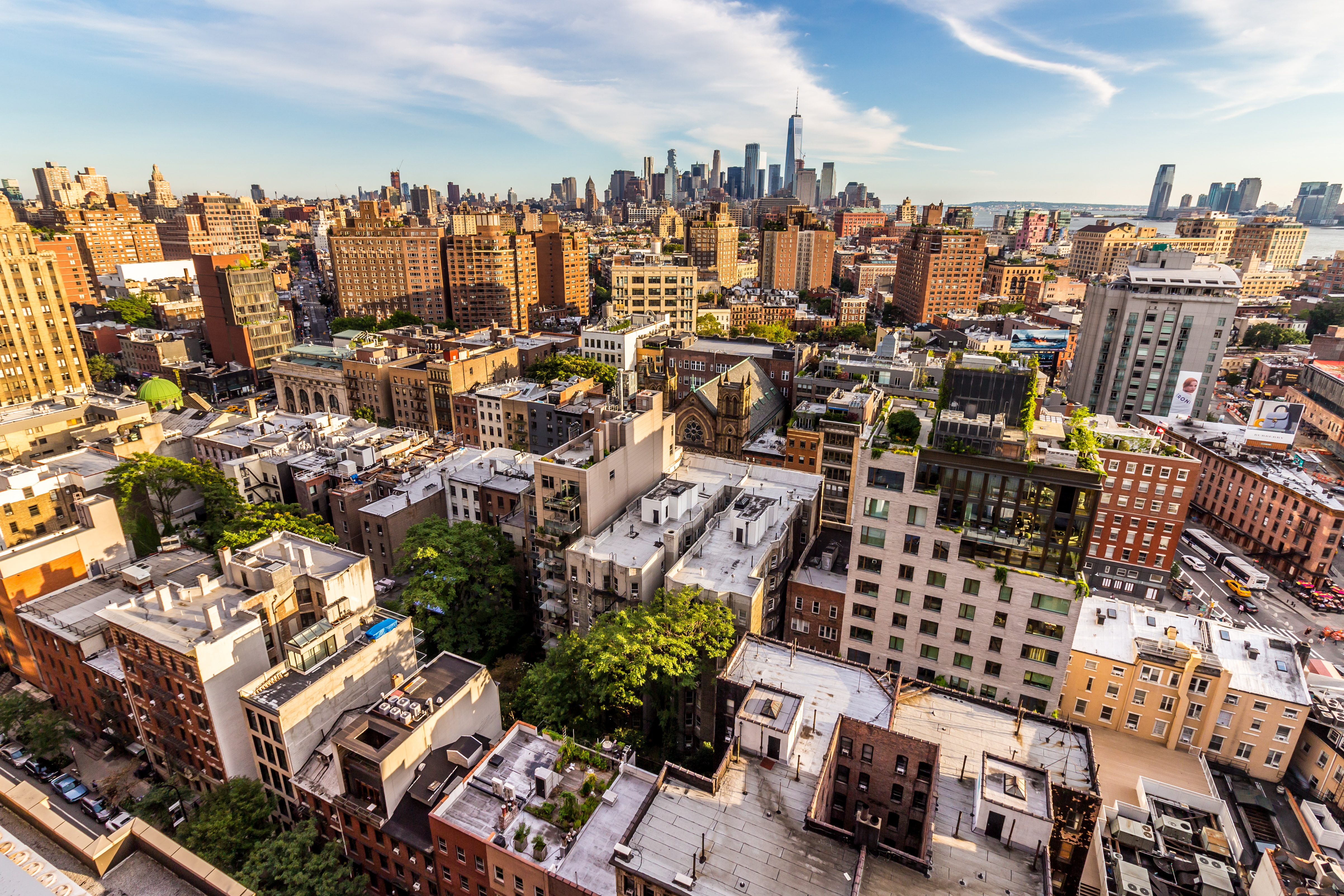
Greenwich is still the top choice for high-earning NYC professionals who want luxury suburban living. It's just 35 miles from Midtown Manhattan with direct Metro-North trains. The commute takes 45-50 minutes to Grand Central.
The Numbers:
- Median home price: $2.1 million
- Rentals: $4,500-$7,000 monthly for 3-bedroom homes
- Property taxes: $25,000-$35,000 per year
- Schools: Greenwich High ranks in top 5% nationally
- Best for: Finance professionals and families who want the best schools
The downtown has upscale shops and restaurants. You'll find waterfront homes and country clubs. It feels nothing like NYC, but you can still get to the city easily.
2. Westport: Creative Professional Haven
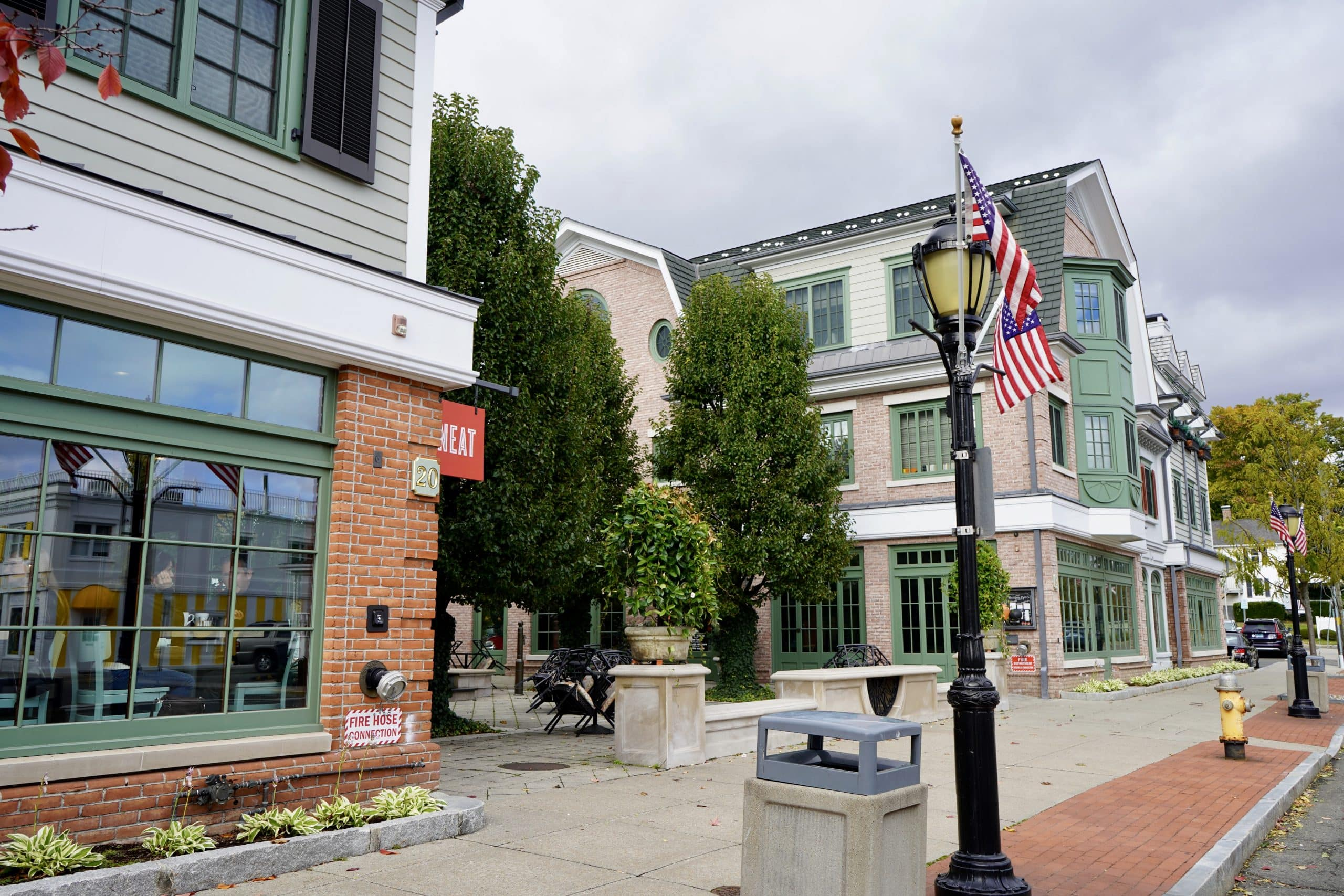
Westport draws creative types, media executives, and entrepreneurs. The town has an arts scene and beaches. You get suburban quiet plus galleries, theaters, and good restaurants.
The Numbers:
- Median home price: $1.4 million
- Rentals: $3,500-$5,500 monthly
- Commute: 55-65 minutes to Grand Central
- Property taxes: $18,000-$25,000 per year
- Key features: Compo Beach, Westport Country Playhouse, busy downtown
3. Stamford: Urban Suburb Hybrid
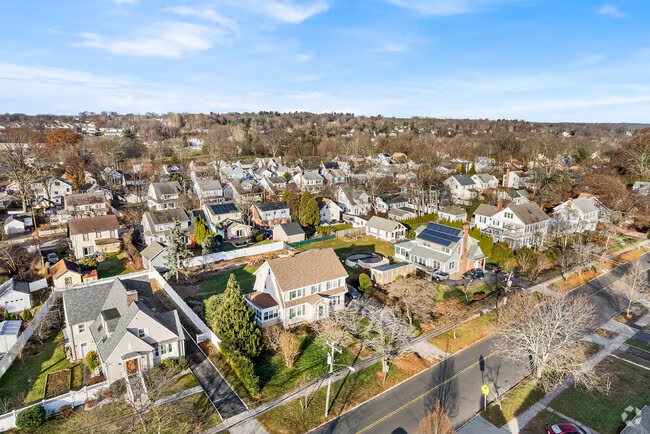
Stamford gives you city life with suburban perks. As Connecticut's second-biggest city, you get jobs, nightlife, and culture - all cheaper than NYC.
The Numbers:
- Median home price: $650,000
- Apartments: $2,000-$3,500 monthly
- Commute: 45-50 minutes express to Grand Central
- Property taxes: $10,000-$15,000 per year
- Jobs: Major companies and Fortune 500 headquarters
Stamford's diverse neighborhoods range from downtown high-rises to suburban subdivisions, accommodating various lifestyle preferences and budgets. For those considering long-distance moving, Stamford serves as an ideal transition from city to suburban living.
Westchester County: The Classic NYC Suburb Choice
Westchester County has long been the traditional choice for NYC families moving to suburbs, offering diverse communities from urban centers to rural retreats, all within reasonable commuting distance of Manhattan.
4. Scarsdale: Education Excellence
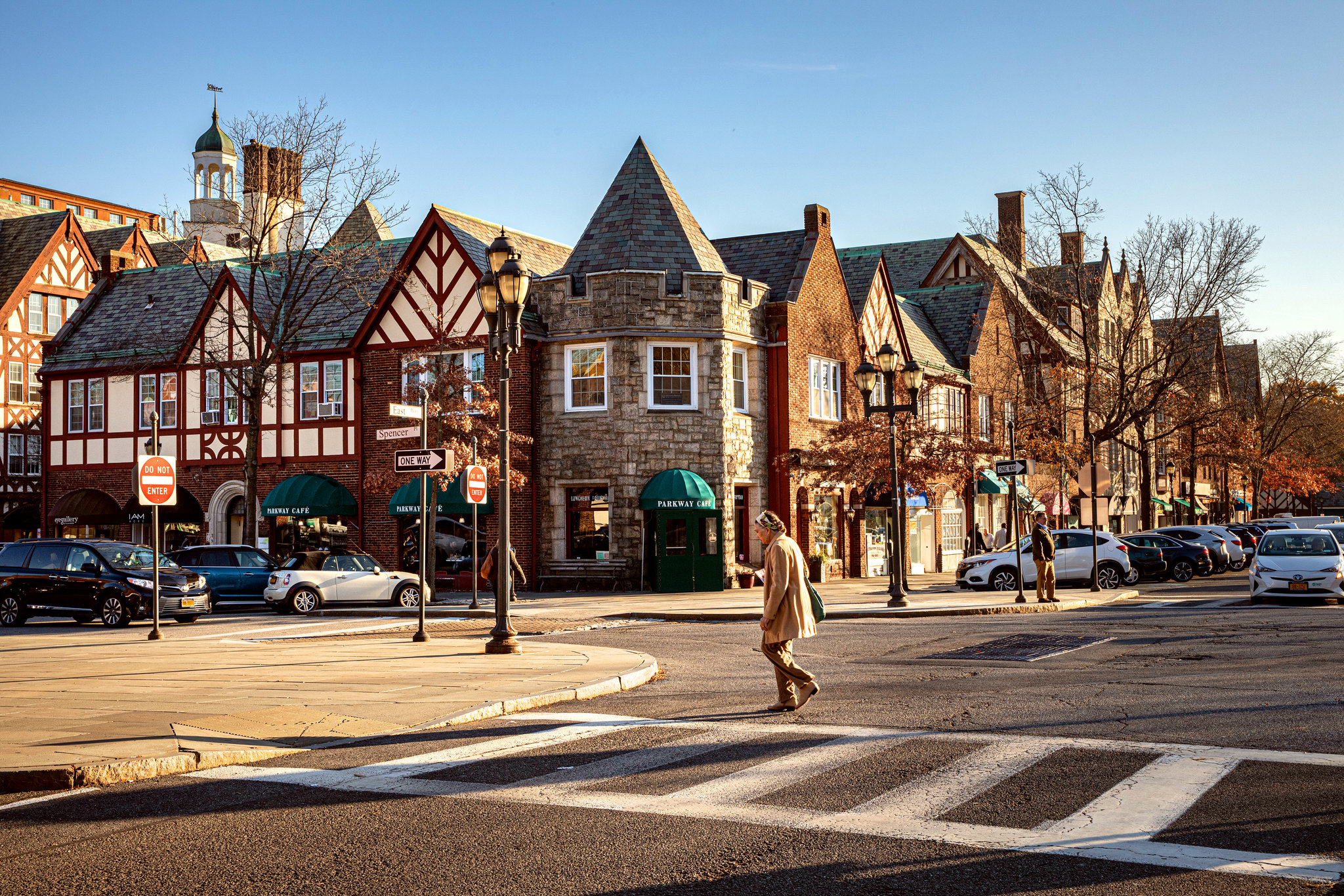
Scarsdale always ranks as one of America's best suburbs for families. Why? The schools. Families who care about education move here and pay top dollar for it.
The Numbers:
- Median home price: $1.5 million
- Commute: 35-40 minutes to Grand Central
- Property taxes: $30,000-$40,000 per year
- Schools: Scarsdale High School ranks #1 in New York State
The village center has nice shops and restaurants. Tree-lined streets and Tudor-style homes give it that perfect suburban look.
5. White Plains: Suburban Downtown
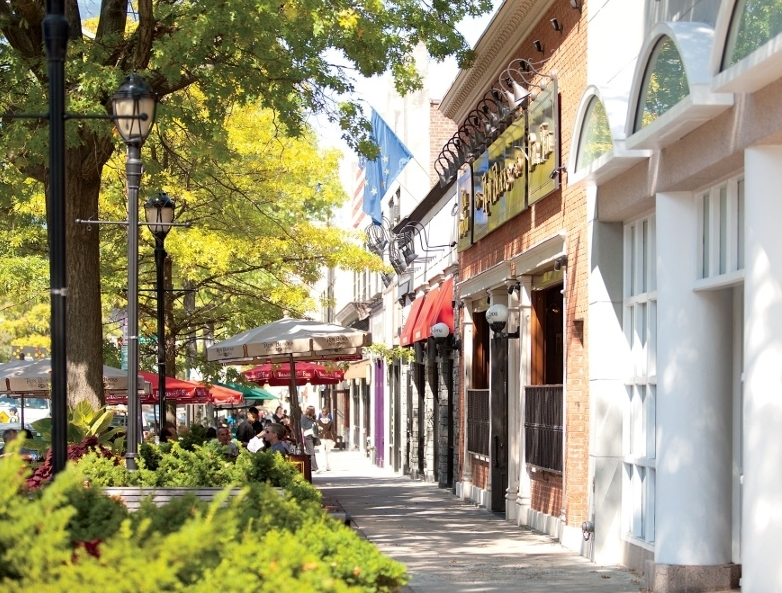
White Plains works for young professionals and growing families. You get city convenience at suburban prices. The downtown has new apartments, shops, and restaurants.
The Numbers:
- Median home price: $750,000
- Rentals: $2,200-$3,800 monthly
- Commute: 35-45 minutes express to Grand Central
- Property taxes: $12,000-$18,000 per year
- Perks: Big shopping centers, hospitals, entertainment
6. Bronxville: Small Town Sophistication
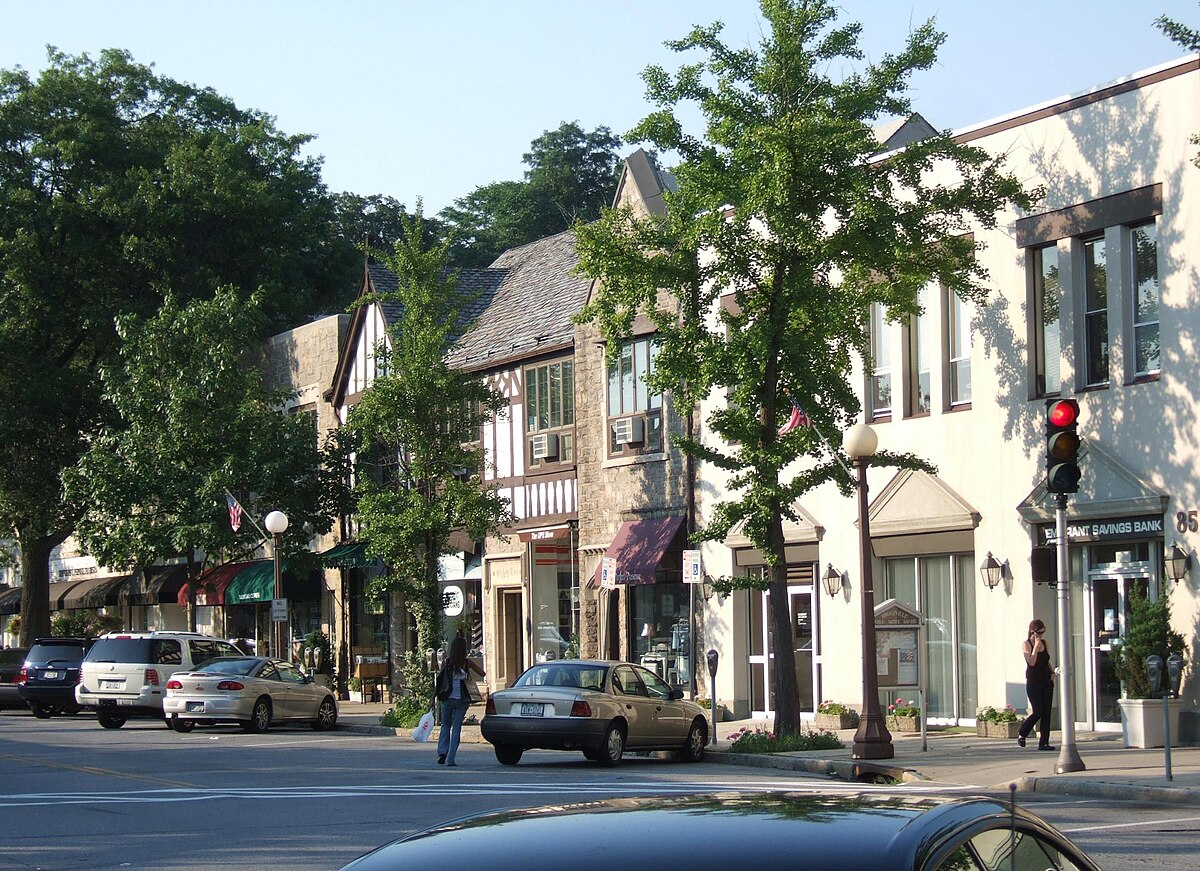
Bronxville is a small village just 15 miles from Manhattan. Professionals who want a quick commute love it here. You get suburban life without the long train ride.
The Numbers:
- Median home price: $1.3 million
- Commute: 30 minutes to Grand Central
- Property taxes: $25,000-$30,000 per year
- Features: Walkable downtown, historic buildings, tight-knit community
New Jersey Suburbs: Value and Variety
Moving from NYC to New Jersey suburbs offers excellent value propositions, with lower taxes than New York suburbs and diverse community options ranging from urban satellites to rural townships.
7. Montclair: Brooklyn's Suburban Sister
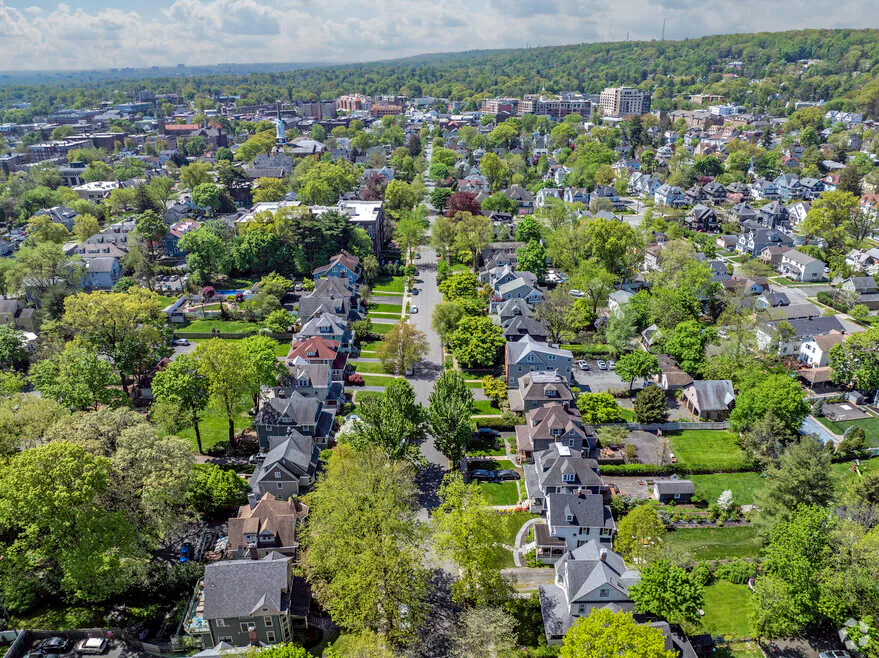
People call Montclair "Brooklyn West" for a reason. Creative professionals, young families, and former NYC residents move here for suburban space with urban culture. The town has Brooklyn's diversity, arts, and politics.
The Numbers:
- Median home price: $850,000
- Rentals: $2,500-$4,000 monthly
- Commute: 45-50 minutes to Penn Station
- Property taxes: $15,000-$20,000 per year
- Culture: Montclair Art Museum, Wellmont Theater, diverse restaurants
8. Summit: Executive Excellence
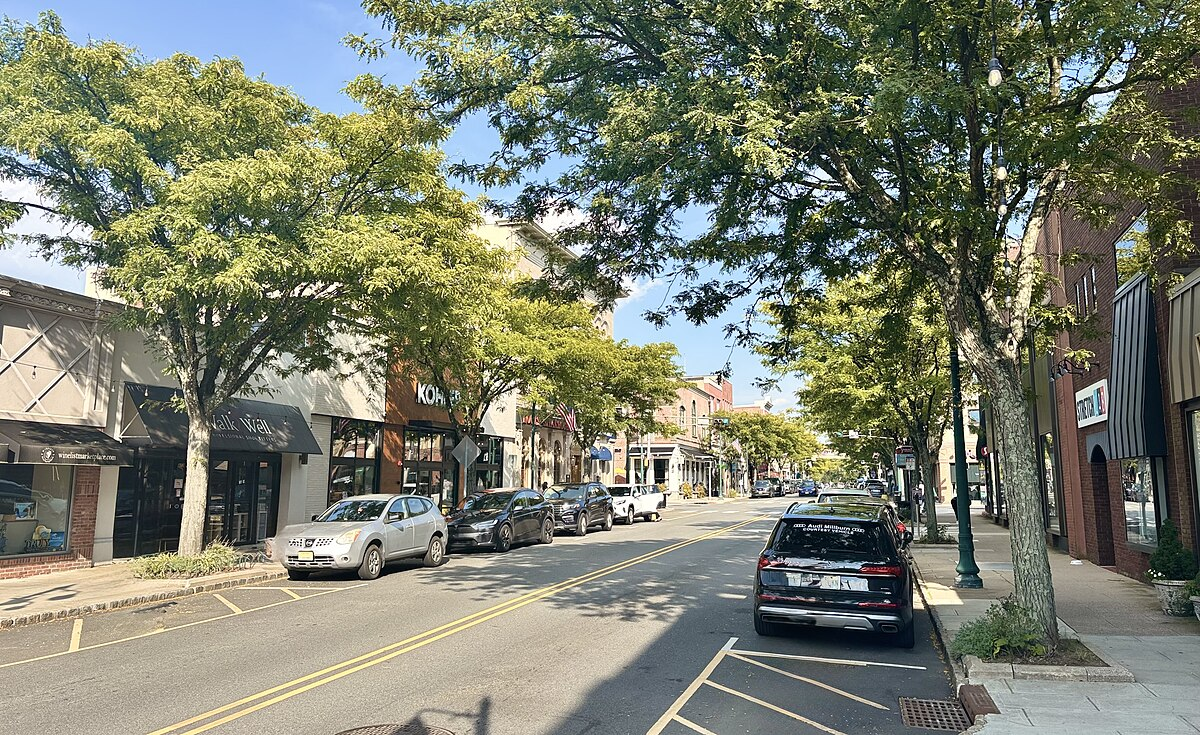
Summit attracts finance professionals and executives. The direct train to Manhattan and great downtown make it popular. You'll find everything from big estates to smaller homes.
The Numbers:
- Median home price: $950,000
- Commute: 40-45 minutes direct to Penn Station
- Property taxes: $16,000-$22,000 per year
- Downtown: Busy shopping area with boutiques and restaurants
9. Hoboken: Urban Suburban Blend
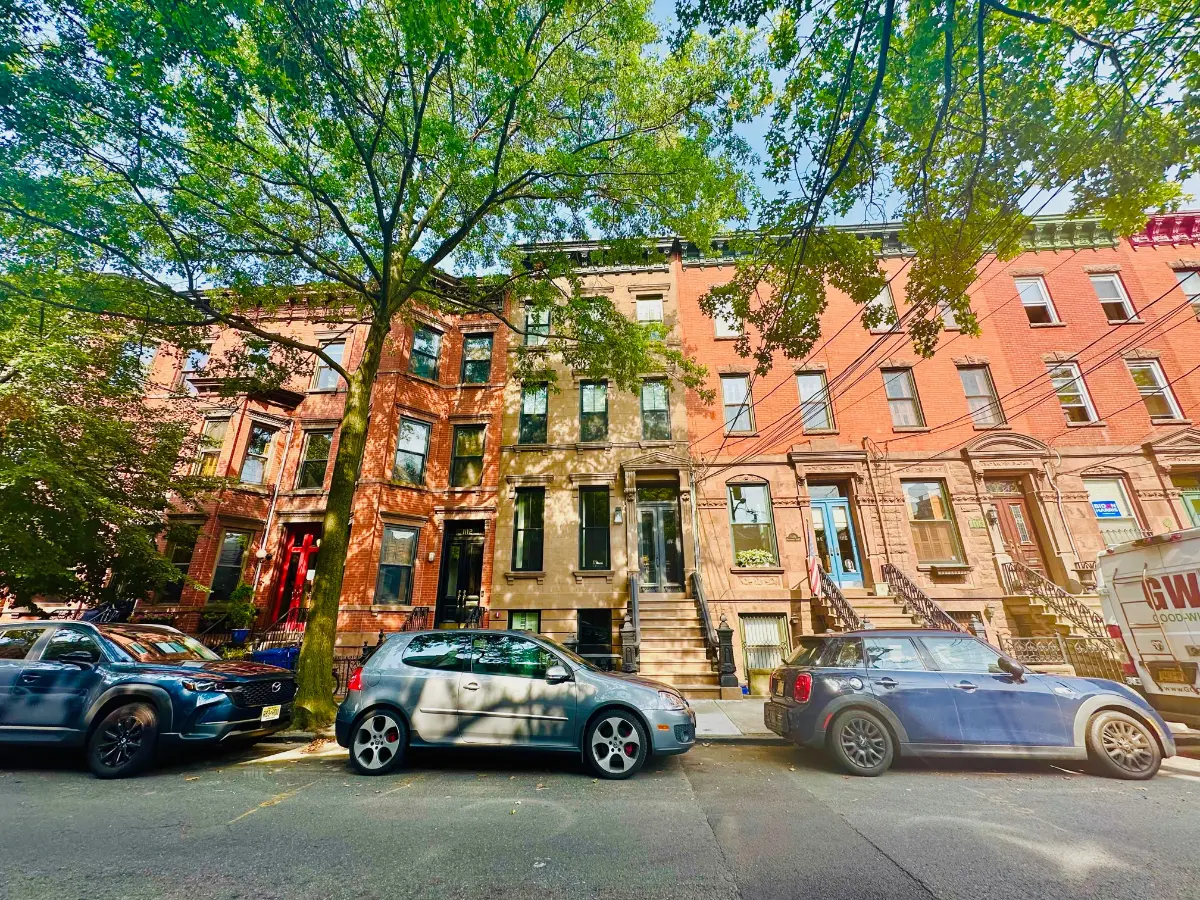
Hoboken is technically a city but works like a suburb for NYC workers. It's super close to Manhattan with city-style amenities. Perfect if you're not ready for full suburban life.
The Numbers:
- Median home price: $750,000
- Rentals: $2,800-$4,500 monthly
- Commute: 15-20 minutes to Manhattan via PATH
- Property taxes: $10,000-$15,000 per year
- Lifestyle: Waterfront parks, restaurants, nightlife, lots of young professionals
For those requiring commercial moving services or relocating home offices, Hoboken's proximity to NYC simplifies the transition.
Long Island Destinations: Beaches and Beyond
Long Island offers NYC residents diverse suburban options from beachfront communities to inland villages, each with distinct character and varying price points.
10. Garden City: Planned Perfection
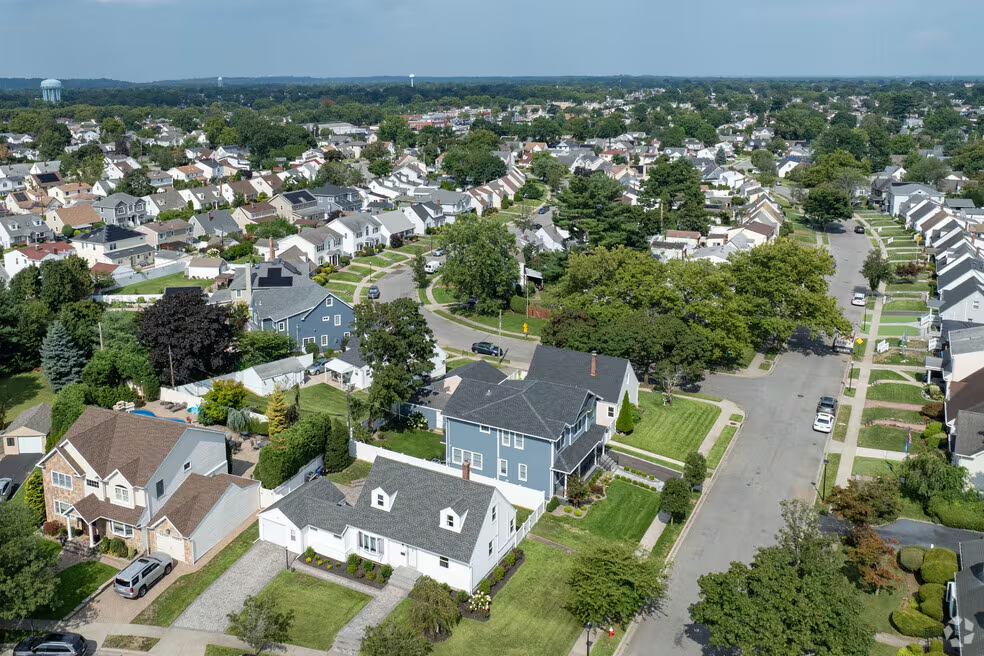
Garden City was planned from the start. Tree-lined streets and a village green make it look like the perfect suburb. Families who want traditional suburban life with NYC access move here.
The Numbers:
- Median home price: $1.1 million
- Commute: 35-40 minutes to Penn Station via LIRR
- Property taxes: $15,000-$20,000 per year
- Highlights: Great schools, walkable downtown, country clubs
11. Rockville Centre: South Shore Favorite
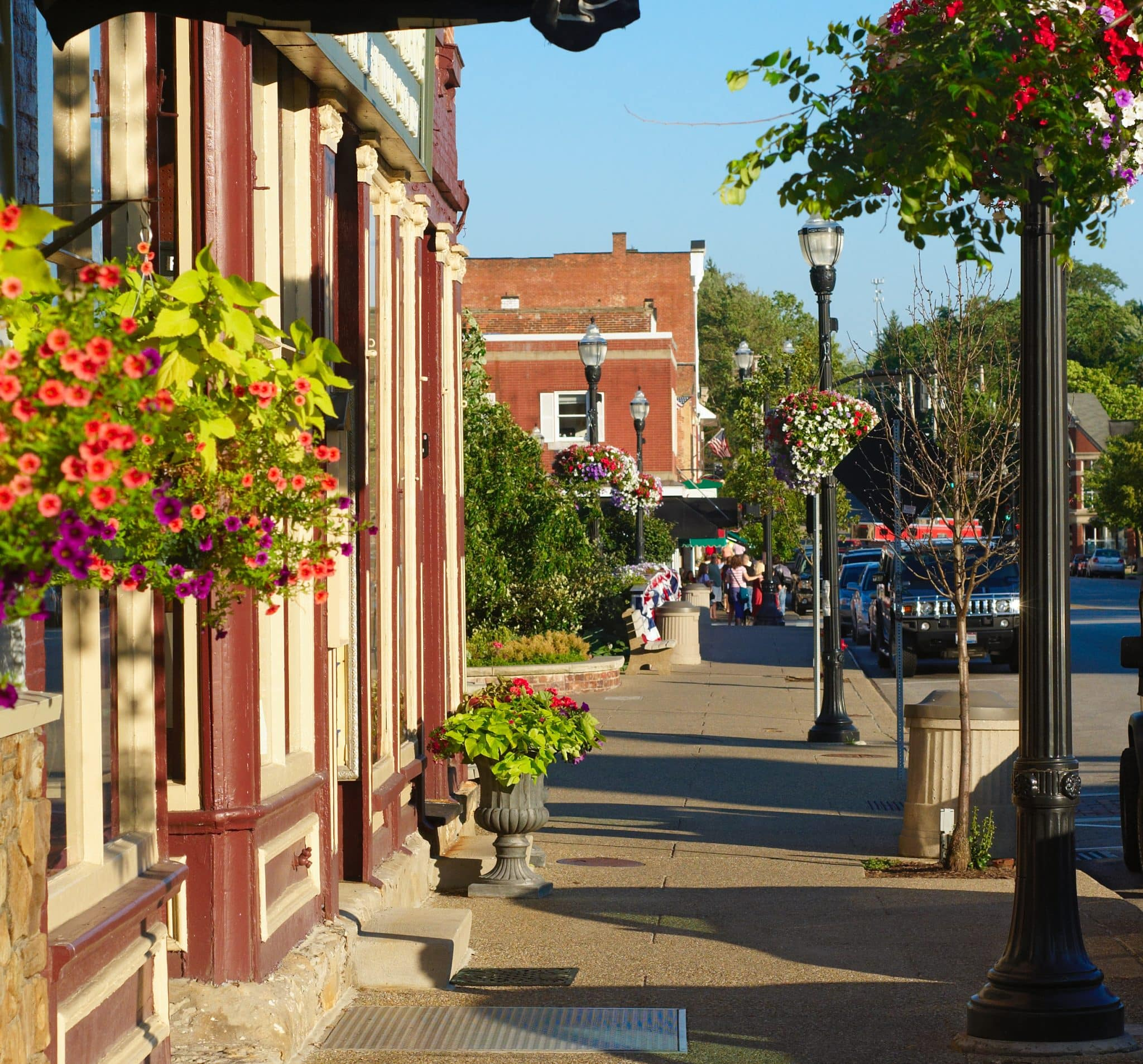
Rockville Centre mixes suburban comfort with a lively downtown. The restaurants, shops, and entertainment make it feel like its own little world.
The Numbers:
- Median home price: $750,000
- Commute: 35-40 minutes to Penn Station
- Property taxes: $12,000-$17,000 per year
- Features: Busy downtown, close to beaches, different types of homes
12. Port Washington: Coastal Living
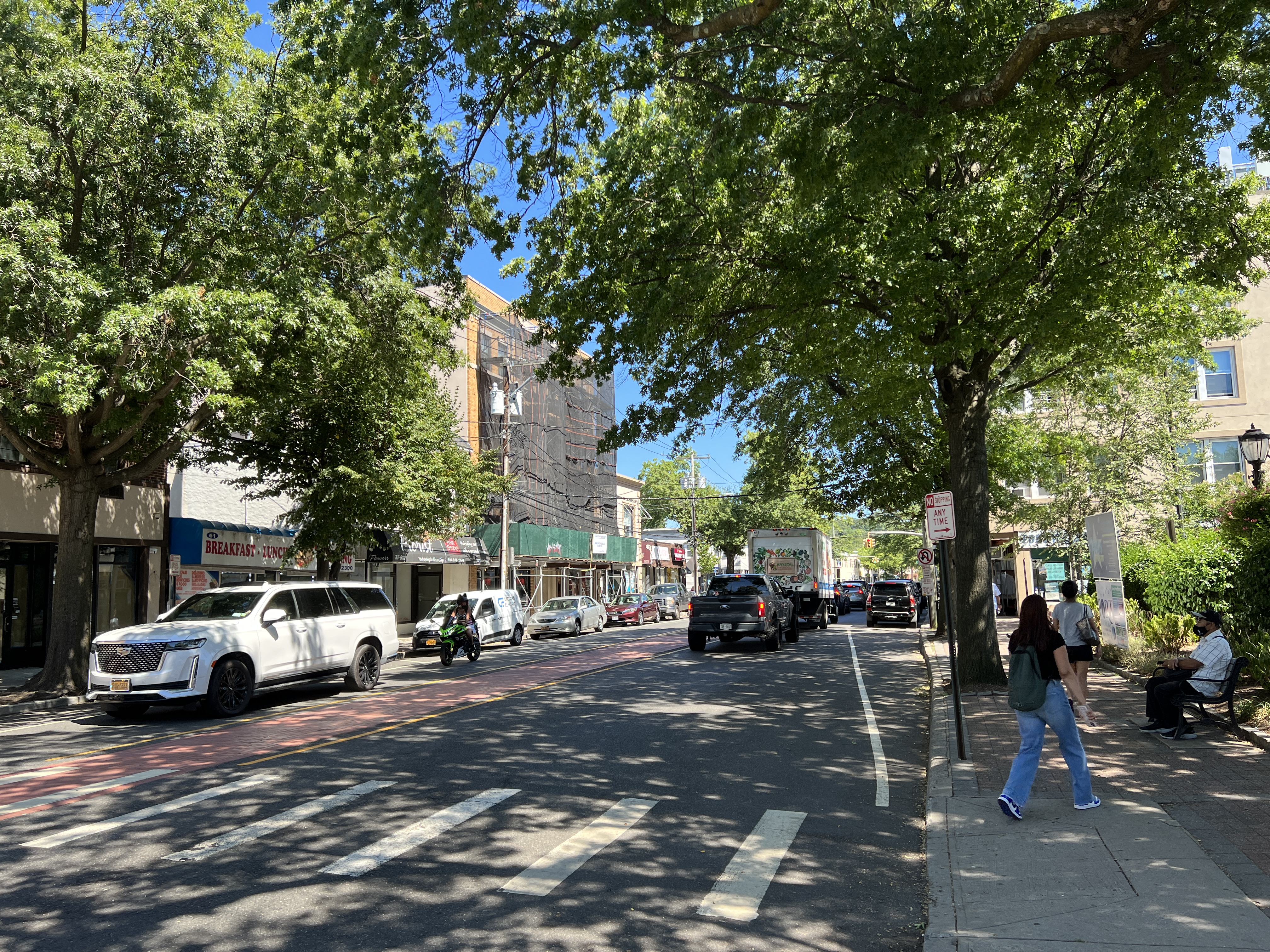
Port Washington gives you waterfront living close to Manhattan. Being on a peninsula means water views everywhere. You still get reasonable commute times too.
The Numbers:
- Median home price: $900,000
- Commute: 40-45 minutes to Penn Station
- Property taxes: $14,000-$19,000 per year
- Attractions: Marinas, waterfront restaurants, beaches, sailing
Emerging Suburban Markets: Hidden Gems
Beyond traditional suburban destinations, several emerging markets offer excellent value for those leaving NYC for suburbs.
13. Beacon, NY: Hudson Valley Alternative
![]()
Beacon is the new hot spot for people leaving NYC for suburbs. Artists, remote workers, and families move here for affordable space that's still connected to NYC.
The Numbers:
- Median home price: $450,000
- Commute: 90 minutes to Grand Central
- Property taxes: $8,000-$12,000 per year
- Appeal: Art scene, hiking trails, revived Main Street, river views
While the commute limits daily travel, Beacon works perfectly for remote workers needing occasional NYC access. Many residents utilize storage services to maintain city connections while embracing Hudson Valley life.
Real Costs of Moving from NYC to Suburbs
Moving from NYC to suburbs costs more than you might think. You need to look at both the obvious costs and the hidden ones.
Moving Expenses Breakdown
Professional moving services for NYC to suburb relocations typically cost:
- Studio/1-bedroom: $1,500-$2,500
- 2-bedroom: $2,500-$4,000
- 3-bedroom: $3,500-$6,000
- 4+ bedroom: $5,000-$10,000
Additional costs include packing services ($500-$2,000), storage fees if needed ($150-$400 monthly), and specialty item handling for pianos or fine art.
Suburban Living Expenses
While housing costs typically decrease, suburban living introduces new expenses:
- Vehicle costs: $700-$1,200 monthly per car (payment, insurance, maintenance)
- Commuting: $200-$500 monthly for train passes
- Home maintenance: $3,000-$6,000 annually
- Utilities: $300-$500 monthly (higher than apartments)
- Property taxes: Variable but significant
Tax Implications
Moving from NYC eliminates city income tax (3.876% top rate) but may increase property taxes. Connecticut and New Jersey have different state tax structures that impact overall tax burden. Consulting tax professionals before relocating helps optimize your financial position.
Lifestyle Adjustments: From City to Suburbs
Moving from city to suburb means changing how you live day to day. Some changes are bigger than others.
Transportation Transformation
You'll need a car in the suburbs. Even in towns with trains, you need a car for shopping, activities, and weekend trips. If you don't drive, you'll need to learn. Then buy a car. Then maintain it. It adds up.
Social Life Changes
In NYC, you can meet friends last minute. In suburbs, you plan ahead. Making new friends takes work. Get involved with schools, join local groups, meet neighbors. Many suburbs have groups for NYC transplants that help.
Shopping and Dining
Shopping means driving to stores, not walking to the corner bodega. Restaurants are good but not as diverse as NYC. Nothing's open super late. But you get better grocery stores, farmers markets, and places where kids are actually welcome.
Making Your Suburban Move Successful
Planning your move from NYC to suburbs takes work. You'll need professional help to do it right.
Timing Your Move
When should you move? Depends on your situation:
- Families with children: Summer moves allow school year starts
- Remote workers: Off-peak seasons offer better rates and availability
- Commuters: Consider trial commutes before committing
Reading our guide on how far in advance to book movers helps secure preferred dates and rates.
Choosing the Right Moving Service
Pick movers who know NYC buildings and suburban deliveries. They need to handle:
- COI insurance documentation for NYC buildings
- Experience with NYC moving regulations
- Suburban delivery capabilities including narrow driveways and stairs
Downsizing Strategies
Moving from a tiny NYC apartment to a big suburban house sounds great. But do you really need all that space? Many people find they've kept stuff that doesn't work in suburban life. Professional packing services help you sort through everything.
Suburban Communities for Every Lifestyle
Each suburb fits different people. Pick one that matches what you want from life.
Family-Focused Communities
Scarsdale, Garden City, and Summit are all about families. Top schools, youth sports, safe streets. Lots of playgrounds, pools, and family events. Perfect for raising kids.
Young Professional Hubs
Hoboken, Stamford, and White Plains work for young professionals. They have nightlife, networking, and city-style fun. You get suburban perks without giving up your social life.
Artist and Creative Enclaves
Beacon, Montclair, and Westport attract creative types. Galleries, studios, cultural events. Artists and writers move here for inspiration and space to work.
The Commuting Reality Check
If you're keeping your NYC job, commuting becomes a big part of life. Know what you're getting into.
Train Commute Considerations
Metro-North and NJ Transit work well, but remember:
- Monthly pass costs ($300-$500)
- Parking fees at stations ($50-$150 monthly)
- Schedule limitations for evening events
- Weather-related delays and cancellations
Hybrid Work Optimization
Make hybrid work easier:
- Clustering office days to minimize commutes
- Utilizing co-working spaces in suburbs
- Creating productive home offices
- Coordinating schedules with other NYC-commuting neighbors
Making the Final Decision
Leaving NYC for suburbs means thinking about more than just money.
Financial Analysis
Add up all the costs:
- Housing savings versus new suburban expenses
- Tax implications of relocation
- Long-term wealth building through homeownership
- Career impact of reduced NYC presence
Lifestyle Priorities
Think about what you really want:
- Space and privacy versus urban energy
- School quality versus cultural diversity
- Community involvement versus anonymity
- Natural settings versus urban conveniences
Trial Runs
Test suburban life before you commit:
- Rent for six months in target communities
- Experience commutes during different seasons
- Attend community events and schools
- Test lifestyle changes like driving everywhere
Conclusion: Your Suburban Future Awaits
Moving from NYC to suburbs is a big change. But for the right person, it's worth it. Maybe you like Connecticut's fancy towns. Or Westchester's family communities. Or New Jersey's good prices. Or Long Island's beaches. There's a suburb for everyone.
To make suburban moving work, be honest about what you want. Research towns carefully. Hire good movers. With remote work now normal and suburbs getting better, leaving NYC for suburbs makes more sense than ever. Especially for families who want space, savings, and better quality of life.
Ready to make your move from NYC to the suburbs? Get your free quote from experienced NYC movers who understand both city regulations and suburban logistics. We handle everything from COI requirements to suburban delivery, making your transition seamless and stress-free.


